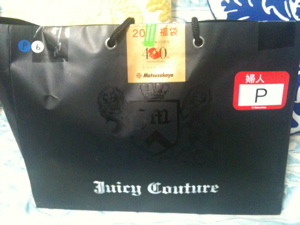「ねえ、マギー、僕が入っていたら超お得じゃない?」
= Nee Maggie, boku ga haitte itara chou otoku janai?
= Hey Maggie, wouldn’t it be a great deal if I were in your “lucky bag”?
Hi everyone! Did you have nice winter holidays?
We will start with something cultural today.
In Japan many stores and restaurants are closed on January 1st. (Most companies are closed on January 1st, 2nd and third as well.) But big stores and department stores open on January 2nd or 3rd for a New Year’s sale.
:u:
初売りセール = hatsuuri seiru (初 = hatsu/sho = the first, 売り= uri/bai = to sell)
People rush to the department stores to buy the 福袋 = fukubukuro of their favorite stores.
:: 福袋 = fukubukuro
![]() 福 = fuku = luck, fortune
福 = fuku = luck, fortune
![]() 袋 = fukuro/bukuro = a bag
袋 = fukuro/bukuro = a bag
The literal meaning is “lucky bag”
So the stores stuff various random contents in a bag and sell them as 福袋 ( = fukubukuro) on January 1st ~ 3rd (→until they are sold out. ) They should contains articles worth much more than the price of the bag.
The popular one will be sold out immediately and people stand in line from early in the morning in order to get the limited number of lucky bags.
The bags are sealed so you can’t peek inside but you are supposed to get much more than you paid for.
But recently many stores have started showing the contents of the bag so that customers don’t waste money for something they don’t need.
I would love to see inside the bags but at the same time, it’s more fun to open the bag in you don’t know what’s inside.
If you go to the store, you will see,
Ex. 福袋 1万円 (3万円相当の商品が入っています。)
= Fukubukuro ichimanen (sanman en soutou no shouhin ga haitte imasu.)
=Lucky bag 10,000 yen (There is 30,000 yen worth of goods inside.)
I got one designer brand “lucky bag “this year. It cost 20,000 yen and according to the shop clerk, it is worth 100,000 yen. Really???
The jeans has a ¥44,000 price tag. (But who would pay ¥44,000 for a pair of jeans???)
The pink camisole has ¥35,000 price tag…So as they said it actually had ¥100,000 value clothes in it.
But somehow I felt like I had lost money… ![]()
It is simply because I couldn’t pick the color, design and exact size and I ended up buying something I don’t even need so it IS a gamble after all…
I think it is a great idea for both the stores and the customers. Customers can get stuff much cheaper than usual and stores can get rid of winter items before spring comes and/or attract more customers by selling those 福袋 ( = fukubukuro ) = lucky bags.
Every year, we see news clips that says some department sell lavish福袋 ( = fukubukuro). Some extreme one costs more than 1 million yen up to 27 million yen. What’s in it? It depends on a year but for example a car, luxurious cruise, air tickets, gold, jewelry, fur coat, etc.
:ddd: From the picture above :
Cookie is in a 福袋 ( = fukubukuro). He says,
「ねえ、マギー、僕が入っていたら超お得じゃない?」
= Nee Maggie, boku ga haitte itara chou otoku janai?
= Hey Maggie, wouldn’t it be a great deal if I were in your “lucky bag”?
*******************************
So today’s focus words are 得 ( = toku) & 損 ( = son)
•損得 = sontoku = loss and gain
![]() 得 = gaining, advantage, profit
得 = gaining, advantage, profit
:ee: verb : to gain
•得をする = toku wo suru !to right! past tense 得をした = toku wo shita
or
•得する = toku suru → past tense 得した = toku shita
![]() 損 = loss, disadvantage
損 = loss, disadvantage
:qq: verb : to lose
•損をする = son wo suru → past tense 損をした = son wo shita
or
•損する = son suru → past tense 損した = son shita
:: Adjective
:u:
•得な = tokuna = gaining / beneficial / profitable/ good purchase / good bargain
•損な = son na = losing/ unprofitable
*******************************
:l: How to use them : When you get something cheaper than usual price, get something extra, you say
得をした = Toku wo shita
or 得した = Toku shita
(Colloquial) 得しちゃった = Tokushichatta!
And if you find out you paid more than its value or the things you bought are much cheaper now, you say
![]() 損をした
損をした
= Son wo shita
or
![]() 損した
損した
= Son shita
(Colloquial) 損しちゃった = Son shichatta
Ex. ビール3本買ったらコーラを一本おまけしてもらった。
= Biiru sanbon kattara koura wo ippon omakeshitemoratta.
= I bought three beers and they gave me a bottle of Coke as a gift.
![]() 得しちゃった! = Toku shichatta. = I am so lucky!/ I saved money.
得しちゃった! = Toku shichatta. = I am so lucky!/ I saved money.
Ex. 年末に買った服が正月明けにセールで半額で売られていた。
= Nenmatsu ni katta fuku ga shougatsu ake ni seiru de hangaku de urarete ita.
= They were selling the clothes I bought at the end of the year at half-off in New Year’s sale.
![]() 1万円も損をした。
1万円も損をした。
= Ichiman yen mo son wo shita.
= That’s 10,000 yen loss for me.
If it is a big loss, you say 大損 = oozon
Ex. 株で大損(を)した。 = Kabu de oozon (wo) shita. = I lost a lot of money on the stock market.
*******************************
★お得 = otoku = good bargain, special discount
We see/ hear this word everywhere when we go shopping.
•お得な商品
= otoku na shouhin
= good bargain articles/ articles with good price
•お得なお値段/サービス
= otoku na onedan / saabisu
= good bargain / special discount service
•今買うとお得!
= Ima kau to otoku!
= Buy now so that you can save a lot of money.
•まとめて買った方がお得です。
= Matomete katta hou ga otoku desu!
= You will save money if you buy in bulk.
•「こちらは大変お得なお買い物ですよ。」
= Kochira wa taihen otoku na okaimono desuyo.
= This is a great bargain.
•会員になった方がお得です。
= Kaiin ni natta hou ga otoku desu.
= If you become a member, you can save money.
→You can get a better deal if you become a member.
•お得情報
= otoku jouhou
= information for good deals →Special service information
*******************************
Not just money but also we use 損 ( = son) and 得 ( = toku) when you talk about advantages, disadvantages or luck.
Ex. 兄弟が多いから長男なんていつも損ばかりしている
= Kyoudai ga ooi kara chounan nante itsumo son bakari shiteiru.
= Since I have many brothers, it is always disadvantage to be the oldest son.
Ex.あの会社では女性が損をしている。
= Ano kaisha dewa josei ga son wo shiteiru.
= The female workers at that company are at a disadvantage.
Ex. そんなことをしてもなんの得にもならない。
= Sonna koto wo shitemo nanno toku nimo naranai.
= There is no advantage in doing such a thing.
If you see your pretty friend is treated better than you, you say,
![]() Ex.美人は得だよね!
Ex.美人は得だよね!
= Bijin wa toku dayone
= Pretty girls get advantages.
There is a proverb,
Ex.早起きは三文の得
(originally 徳 ( = toku) virtue but many people use 得 now.)
= Hayaoki wa sanmon no toku.
=Early to bed and early to rise makes a man healthy, wealthy and wise
or The early bird catches the worm.
Ex. 心配して損した!
= Shinpai shite son shita!
= I worried about nothing.
*******************************
~なくては(なくちゃ/なきゃ)損
= ~ nakutewa (nakucha/nakya) son
= have to get one’s money’s worth from something.
Note : なきゃ ( = nakya) / なくちゃ ( = nakucha ) = casual way to say なくては ( = nakutewa)
See the my lessons : なきゃ&なくちゃ = nakya & nakucha
Ex. バイキングだから食べなくちゃ損だよ!
= Baikingu dakara ippai tabenakucha son dayo!
= It is all-you-can-eat so we should eat a lot. (We should eat more than we paid.)
Ex. カラオケでは一杯歌って楽しまなきゃ損!
= Karaoke dewa ippai utatte tanoshimanakya son!
= We have to sing a lot and have fun at Karaoke. (to get one’s money’s worth from)
Note : なきゃ ( = nakya) = casual way to say なくては ( = nakutewa)
Ex. 何もお酒を飲まなかったのに割り勘なんて何か損した気分だ。
= Nani mo osake wo nomanakatta noni warikan nannte nanka son shita kibun da.
= Although I didn’t drink alcohol at all, we ended up splitting the bill. (I feel like I have lost money) →That is not fair.
Ex. エコノミークラスが一杯でビジネスクラスにアップグレードしてもらっちゃった。すごく得した気分!
= Ekonomii kurasu ga ippai de bijinesu kurasu ni appu gureido shite moracchatta. Sugoku toku shita kibun!
= Since economy class was full, I got my seat upgraded to business class. I am so lucky!
*******************************
Break even is
:u:
損得なし= sontoku nashi
or
損得ゼロ = sontoku zero
When we think about something without worrying about loss and gain or pros and cons, we say
![]() 損得を考えない
損得を考えない
= Sontoku wo kangaenai.
or ![]()
損得勘定抜きで考える
= Sontoku kanjou nuki de kangaeru
= To think about something without calculating profit and loss.
*******************************
You can describe one’s personality with 損 ( = son) and 得 ( = toku)
!candy! • 得な性格
= toku na seikaku
![]() optimistic, positive, resilient, sociable, lovable (You don’t need to make any effort. People just love you the way you are.),
optimistic, positive, resilient, sociable, lovable (You don’t need to make any effort. People just love you the way you are.),
:yy: •損な性格
= son na seikaku
![]() weak personality, negative, passive, unsociable, inhibit, shy, clumsy, too worry about other people’s feeling
weak personality, negative, passive, unsociable, inhibit, shy, clumsy, too worry about other people’s feeling
Ex. マギーは得な性格だよね。 何も言わなくてもみんなが手伝ってくれるから。
= Maggie wa tokuna seikaku dayone. Nanimo iwanakutemo minna ga tetsudatte kureru kara.
= Maggie is very lucky. (She doesn’t have to make any effort to ask anybody for help.) Everybody just helps her without asking them.
Ex.彼は損な性格だから嫌と言えないで他の人の仕事もやるはめになる。
= Kare wa sonna seikaku dakara iya to ienai de hoka no hito no shgioto wo yaru hame ni naru.
= Because of his weak personality, he can’t say “No” (to others ) and he ends up doing other people’s job.
 マギー先生より= Maggie Sensei yori = From Maggie Sensei
マギー先生より= Maggie Sensei yori = From Maggie Sensei
クッキーへ = Cookie ye = To Cookie,
ぶっちゃけあんたが入っているよりも猫が入っていた方が嬉しいわ!
= Bucchake anta ga haitte iruyorimo neko ga haitte ita hou ga ureshiiwa!
= To be honest, I would prefer to have a cat in a bag to you.
(Note : ぶっちゃけ= bucchake = (slang) to be frank, to be honest )
***
Will you be my Patron?
I appreciate your support! サポートありがとう!







6 Comments
マギー先生のレッスンを読まなきゃ損!(あ、違うかwお金払ってねぇし)
明けましておめでとう♪
@curryisyummy
明けましておめでとう!!久しぶり!元気だった?
さすが、腕をあげてもう一人ツッコミできるね(笑)
初売りセール = hatsuuri siru
hatsuuri se-ru ではないでしょうか。
@Authist
Thank you!!! I fixed it!
You had a (really funny bilingual) typo: 売(り) you listed as having the readings uri/buy instead of uri/bai :)
@KG
Haha! Thank you! I fixed it.
売 means “to sell” but its on reading is bai = “buy”. I didn’t realized it until now.